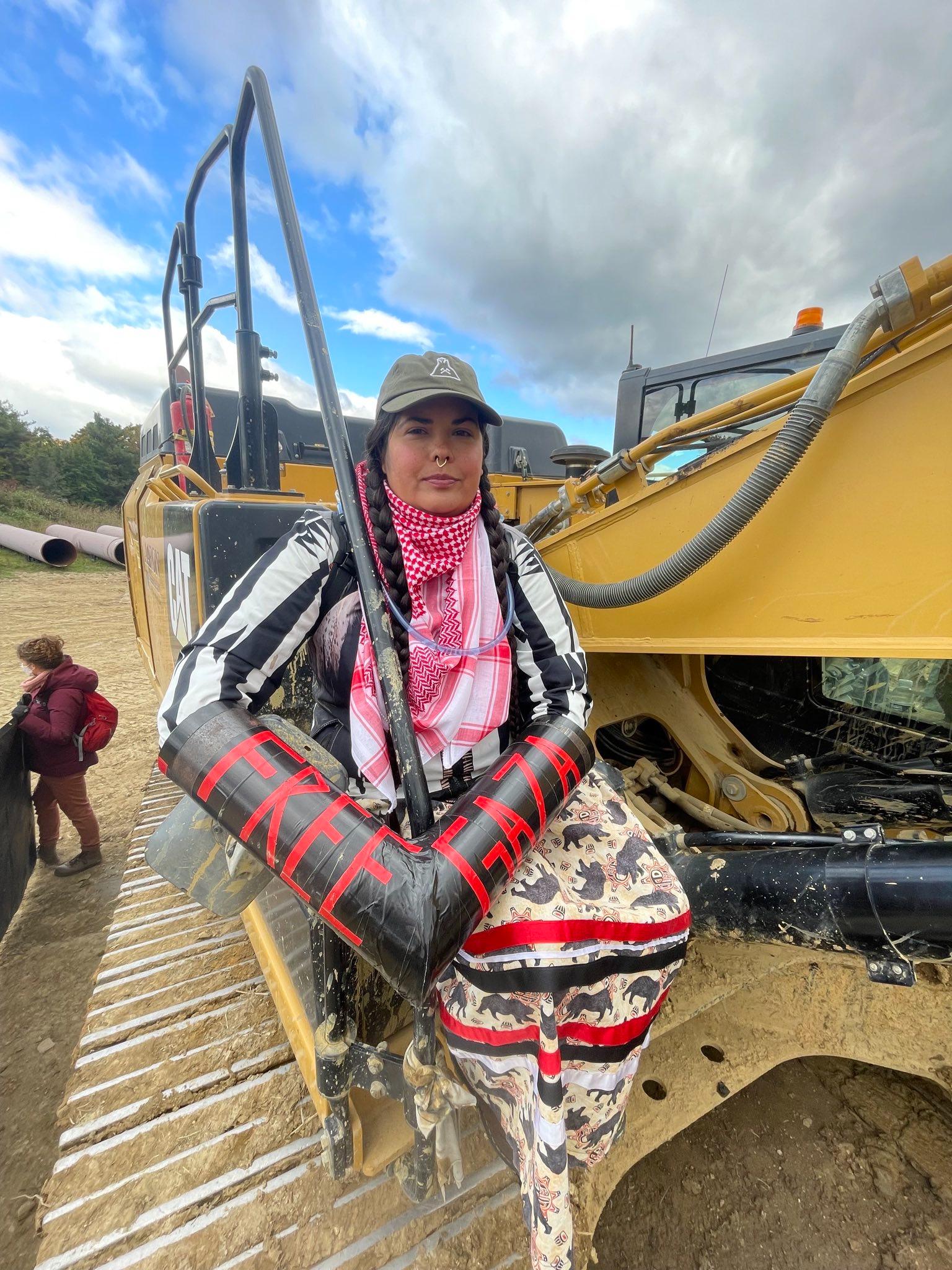
Houska told Native News Online that she was released on Tuesday after posting $2,000 cash bail for criminal trespassing in Montgomery County.
“We cannot succumb to powerlessness,” Houska said in a statement. “The real power I have encountered in this world is in the people, in nature. We will not back down when we stand with truth and love in our hearts. For the earth, for our children. End apartheid. Free Gaza. Stop Mountain Valley Pipeline.”
On Monday, three people locked themselves to construction equipment at sites along the Mountain Valley Pipeline route and halted drilling under the highway and train tracks next to the Roanoke River for the day. The $6.6 billion natural gas pipeline will transport up to 2 billion cubic feet of natural gas in the area and will cross more than 1,000 streams and wetlands in Appalachia, according to Appalachians Against Pipelines, a coalition of activists who have been organizing direct actions against the Mountain Valley Pipeline since 2018.
Mountain Valley Pipeline filed a lawsuit against Appalachians Against Pipelines in an effort to silence their efforts and decry their actions to slow the construction of the pipeline.
The 304-mile pipeline began construction in 2018 but has since been stalled over the last two years by legal challenges. The 4th Circuit Court of Appeals blocked construction in early July while federal permits are under review. However, the Supreme Court struck down the 4th Circuit Court of Appeals ruling on July 27. President Biden signed the Fiscal Responsibility Act earlier this summer, which stripped the 4th Circuit Court of Appeals from jurisdiction on the case and cleared the path for the final permits needed for the Mountain Valley Pipeline.
The pipeline was backed by Virginia Senator Joe Manchin (D-WV) who is reported as the biggest recipient of fossil fuel in U.S. Congress. In July, Manchin filed a brief against the 4th Circuit Court of Appeals ruling and later announced on Twitter that he was glad the highest court in the land cleared the way for the pipeline’s final construction.
After Houska was released from jail on Tuesday, she thanked Appalachians Against Pipelines for opposing the construction of the pipeline and for standing in solidarity with Indigenous opposition to the Line 3 expansion.
“Chi-miigwech to every person around the globe marching for Palestine, giving their hearts and their love, refusing to look away and be complicit,” she said.
Earlier this year, Native News Online reported that Houska was awarded the Dickenson College’s Sam Rose ’58 and Julie Walters Prize for Global Environmental Activism. In addition to a multi-day residency at the college, she was awarded $100,000. Houska is a Couchiching First Nations citizen, grew up in Ranier, Minnesota, and earned a B.A., B.S., and J.D. from the University of Minnesota. She went on to practice law in Washington, D.C. and clerked in the Obama Administration.
More Stories Like This
Native News Weekly (August 25, 2024): D.C. BriefsCheyenne River Youth Project to Celebrate Women’s Strength at Barbie-Themed Passion for Fashion on March 14
Celebrating Native American Women
Native Bidaské: The Illusion of Freedom and the Myth of America 250, Leonard Peltier Speaks Out
Monday Morning (March 2, 2026): Articles You May Have Missed This Past Weekend
Help us defend tribal sovereignty.
At Native News Online, our mission is rooted in telling the stories that strengthen sovereignty and uplift Indigenous voices — not just at year’s end, but every single day.
Because of your generosity last year, we were able to keep our reporters on the ground in tribal communities, at national gatherings and in the halls of Congress — covering the issues that matter most to Indian Country: sovereignty, culture, education, health and economic opportunity.
That support sustained us through a tough year in 2025. Now, as we look to the year ahead, we need your help right now to ensure warrior journalism remains strong — reporting that defends tribal sovereignty, amplifies Native truth, and holds power accountable.
 The stakes couldn't be higher. Your support keeps Native voices heard, Native stories told and Native sovereignty defended.
The stakes couldn't be higher. Your support keeps Native voices heard, Native stories told and Native sovereignty defended.
Stand with Warrior Journalism today.
Levi Rickert (Potawatomi), Editor & Publisher

